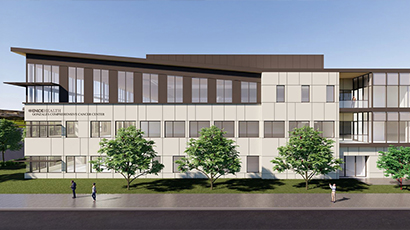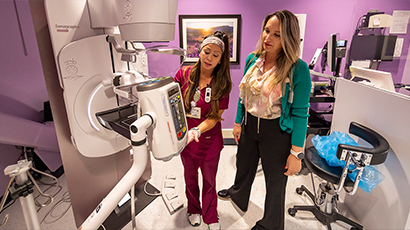Prestigious Research Project Grant (R01) grants are the original and historically oldest grant mechanisms given by the National Institutes of Health (NIH). These mature research projects are hypothesis-driven and supported by strong preliminary data. The National Cancer Institute, within the NIH, awards R01 grants for cancer-related research.

Laura Fejerman wins $3 million R01 grant to research breast cancers in Latinas
Laura Fejerman is principal investigator for a $3.1 million R01 grant to research breast cancer in Latinas. Julie Dutil, professor at the University of Puerto Rico, is co-principal investigator.
The goal of the study is to look at the genetic architecture of breast cancer overall as well as distinct tumor subtypes, which can lead to differing prognoses.
Advances in DNA genotyping and sequencing technologies have led to the identification of more than 300 germline variants that contribute to breast cancer risk. However, as of today, most of that breast cancer research has involved women of European ancestry.
The five-year Latin America Genomics of Breast Cancer Risk Study will study combined genetic and risk factors and account for variation by ancestry and geography. The project supports a consortium of investigators in the U.S. and Latin America (The LAGENO consortium) that focuses on breast cancer studies in Latinas. Countries represented include Mexico, Guatemala, Chile, Argentina, Brazil, Peru, Colombia, Uruguay, and Puerto Rico.

Aiming Yu awarded two R01 grants totaling more than $3 million
Aiming Yu is a professor of biochemistry and molecular medicine who explores novel anticancer agents and investigates experimental therapeutics. Yu directs the PK/PD Bioanalytical Core Facility and oversees the Molecular Pharmacology and Chemical Biology Shared Resources at the cancer center in support of drug development programs. He was awarded two R01 grants in 2024:
Novel biologic RNA molecules to modulate HCC metabolism
This $2.4 million award supports Yu’s studies regarding the production and utilization of one-of-a-kind, recombinant RNA molecules to modulate liver cancer metabolism to enhance therapeutic outcomes.
Novel bioengineered microRNA therapeutics for lung cancer
This $1.9 million R01 renewal award is allowing Yu and his team to investigate novel therapeutic microRNAs for the treatment of lung cancer.
Both programs are built upon RNA molecular bioengineering technology Yu and his team invented at UC Davis and protected by active patents.

Kowalczykowski
Stephen Kowalczykowski awarded $2.5 million R01 grant to study defective proteins that cause cancer
Stephen Kowalczykowski, distinguished professor in the Department of Microbiology and Molecular Genetics, earned a $2.5 million R01 grant for “Molecular Functions of BRCA2 and RAD51 Paralogs in Homologous Recombination and Chromosome Maintenance.”
DNA repair will be the focus of the grant. DNA repair by homologous recombination (HR) is a fundamental biological process necessary for the maintenance of chromosomal integrity. The failure to maintain genomic integrity is a major source of predisposition to cancer and hematological malignancies such as Fanconi’s anemia. Kowalczykowski’s research will study gene mutations in proteins RAD51, BRCA2, and the RAD51 paralogs, RAD51B, RAD51C, RAD51D, XRCC2, and XRCC3—all known to trigger cancer.





